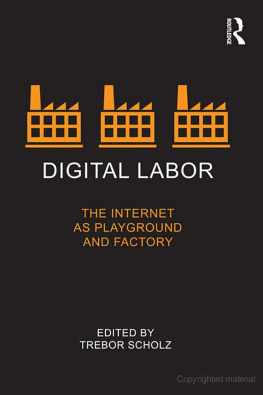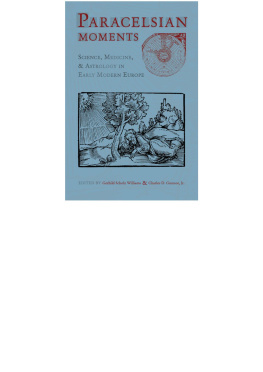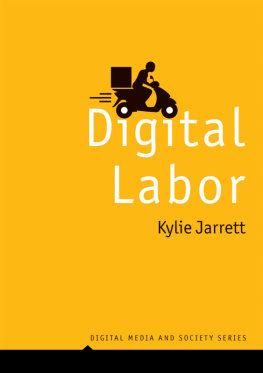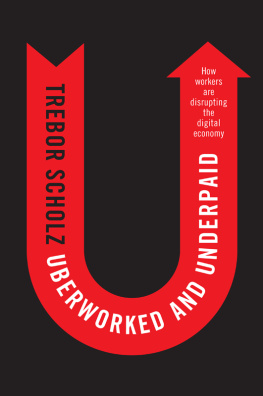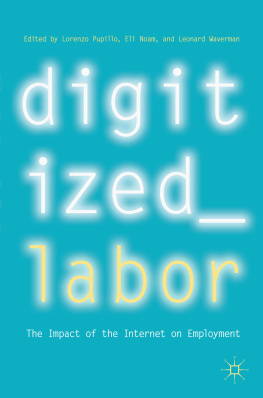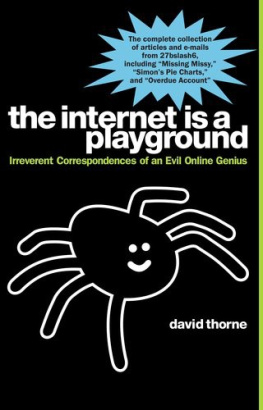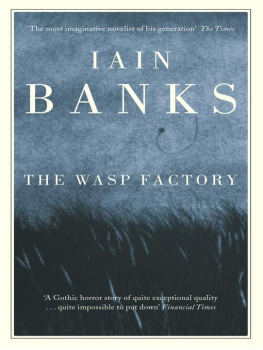Trebor Scholz (Ed.) - Digital Labor: The Internet as Playground and Factory
Here you can read online Trebor Scholz (Ed.) - Digital Labor: The Internet as Playground and Factory full text of the book (entire story) in english for free. Download pdf and epub, get meaning, cover and reviews about this ebook. year: 2013, publisher: Routledge, genre: Politics. Description of the work, (preface) as well as reviews are available. Best literature library LitArk.com created for fans of good reading and offers a wide selection of genres:
Romance novel
Science fiction
Adventure
Detective
Science
History
Home and family
Prose
Art
Politics
Computer
Non-fiction
Religion
Business
Children
Humor
Choose a favorite category and find really read worthwhile books. Enjoy immersion in the world of imagination, feel the emotions of the characters or learn something new for yourself, make an fascinating discovery.
- Book:Digital Labor: The Internet as Playground and Factory
- Author:
- Publisher:Routledge
- Genre:
- Year:2013
- Rating:3 / 5
- Favourites:Add to favourites
- Your mark:
- 60
- 1
- 2
- 3
- 4
- 5
Digital Labor: The Internet as Playground and Factory: summary, description and annotation
We offer to read an annotation, description, summary or preface (depends on what the author of the book "Digital Labor: The Internet as Playground and Factory" wrote himself). If you haven't found the necessary information about the book — write in the comments, we will try to find it.
Digital Labor: The Internet as Playground and Factory — read online for free the complete book (whole text) full work
Below is the text of the book, divided by pages. System saving the place of the last page read, allows you to conveniently read the book "Digital Labor: The Internet as Playground and Factory" online for free, without having to search again every time where you left off. Put a bookmark, and you can go to the page where you finished reading at any time.
Font size:
Interval:
Bookmark:

Digital Labor calls on the reader to examine the shifting sites of labor markets to the Internet through the lens of their political, technological, and historical making. Internet users currently create most of the content that makes up the web: they search, link, tweet, and post updatesleaving their deep data exposed. Meanwhile, governments listen in, and big corporations track, analyze, and predict users interests and habits.
This unique collection of essays provides a wide-ranging account of the dark side of the Internet. It claims that the divide between leisure time and work has vanished so that every aspect of life drives the digital economy. The book reveals the anatomy of playbor (play/labor), the lure of exploitation and the potential for empowerment. Ultimately, the 14 thought-provoking chapters in this volume ask how users can politicize their troubled complicity, create public alternatives to the centralized social web, and thrive online.
Trebor Scholz is Associate Professor of Culture and Media at The New School.
The Internet as Playground and Factory
Edited by Trebor Scholz

First published 2013
by Routledge
711 Third Avenue, New York, NY 10017
Simultaneously published in the UK
by Routledge
2 Park Square, Milton Park, Abingdon, Oxon OX14 4RN
Routledge is an imprint of the Taylor & Francis Group, an informa business
2013 Taylor & Francis
The right of the editor to be identified as the author of the editorial material, and of the authors for their individual chapters, has been asserted in accordance with sections 77 and 78 of the Copyright, Designs and Patents Act 1988.
All rights reserved. No part of this book may be reprinted or reproduced or utilised in any form or by any electronic, mechanical, or other means, now known or hereafter invented, including photocopying and recording, or in any information storage or retrieval system, without permission in writing from the publishers.
Trademark notice: Product or corporate names may be trademarks or registered trademarks, and are used only for identification and explanation without intent to infringe.
Library of Congress Cataloging-in-Publication Data
Digital labor : the Internet as playground and factory / edited by Trebor Scholz.
p. cm.
Includes bibliographical references and index.
1. InternetSocial aspects. 2. Information society.
I. Scholz, Trebor.
HM851.D538 2013
302.231dc23 2012012133
ISBN: 978-0-415-89694-8 (hbk)
ISBN: 978-0-415-89695-5 (pbk)
ISBN: 978-0-203-14579-1 (ebk)
Typeset in ApexBembo
by Apex CoVantage, LLC
Trebor Scholz
Andrew Ross
Tiziana Terranova
Sean Cubitt
McKenzie Wark
Ayhan Aytes
Free Labor
Abigail De Kosnik
Patricia Ticineto Clough
Jodi Dean
Mark Andrejevic
Jonathan Beller
Lisa Nakamura
Michel Bauwens
Christian Fuchs
Ned Rossiter and Soenke Zehle
Many thanks go to a great many people. I am indebted to my colleagues at The New School, a university in New York City, who have generously and enthusiastically supported my work, specifically The Politics of Digital Culture conference series that I started there in 2009.
Nearly three years have passed since I convened The Internet as Playground and Factory conference that led to the publication of this book. I wish to recognize and thank the participants of this conference who have contributed chapters to this book.
I would like to particularly thank my colleague McKenzie Wark for his intellectual fire and many helpful critical comments. Also working with Erica Wetter at Routledge has been a pleasure.
I would like to thank the following friends and colleagues, for thought-provoking debates, challenging and constructive comments, practical help with the conference, and putting this book together: Frank Pasquale, Neil Gordon, Gabriella Coleman, Shannon Mattern, Laura De Nardis, Mark Greif, Sven Travis, Joel Towers, Jenny Perlin and the students in my spring 2012 seminar Play and Toil in the Digital Sweatshop.
In addition, I would also like to thank the members of the mailing list of the Institute for Distributed Creativity for the six-month-long pre-conference discussion on the commercial geographies of unsung digital labor, value, and the fight for fairness and economic democracy.
I dedicate this book to the memory of my grandmother Herta Fritzsche, who was born in 1917 and labored as a home worker most of her life.
R. Trebor Scholz
Why Does Digital Labor Matter Now?
Trebor Scholz
In 2009, the Internet as Playground and Factory conference at The New School, a university in New York City with a rich history of critical theory and student activism, asked whether Marxist labor theory, with its concept of exploitation of labor, is still applicable to emerging modes of value capture on the Internet. This book is a result of this international conference that I convened.
What does it mean to be a digital worker today? The Internet has become a simple-to-join, anyone-can-play system where the sites and practices of work and play increasingly wield people as a resource for economic amelioration by a handful of oligarchic owners. Social life on the Internet has become the standing reserve, the site for the creation of value through ever more inscrutable channels of commercial surveillance. This inquiry has important ramifications for struggles around privacy, intellectual property rights, youth culture, and media literacy.
To this collection of essays the authors bring a common commitment to understanding the complex implications of new forms of waged and unwaged digital labor. Throughout this publication, you will find the consistent analysis of digital labor as a continuation of the social relations surrounding the traditional work-place. While also exploring discontinuities, shifts of labor markets to the Internet are described as an intensification of traditional economies of unpaid work.
Over the past six years, web-based work environments have emerged that are devoid of the worker protections of even the most precarious working-class jobs. Amazon.coms Mechanical Turk is only one example. These are new forms of labor but old forms of exploitation. There are no minimum wages or health insurance, and so far federal and state regulators have not intervened. Digital labor matters; such underpaid, waged occupations must not be ignored when thinking about cognitive capitalism.
But several authors in this book are also thinking about unwaged labor, the activation of our behavior on the social web as monetizable labor. This argument is frequently challenged because in opposition to traditional labor, casual digital labor looks merely like the expenditure of cognitive surplus, the act of being a speaker within communication systems. It doesnt feel, look, or smell like labor at all. This digital labor is much akin to those less visible, unsung forms of traditional womens labor such as child care, housework, and surrogacy.
In 2011, the value of Facebook was pegged at $100 billion, which can be linked to vast financial speculation but also the companys collection of user data over a seven-year time span. Intimate forms of human sociability are being rendered profitable for Facebook, which makes it such a big-ticket company. Facebook sells its user data to its customers, which are mostly third-party advertisers. The social web appears to be free for us to use, but there are hefty social costs; oligarchs capture and financialize our productive expression and take flight with our data. We, the users, are sold as the product. The loss of our privacy, with all its psychological and political consequences, buys us the convenience of free, innovative services. All of life is put to work, unfairly harnessing implicit participation for wild profits.
Font size:
Interval:
Bookmark:
Similar books «Digital Labor: The Internet as Playground and Factory»
Look at similar books to Digital Labor: The Internet as Playground and Factory. We have selected literature similar in name and meaning in the hope of providing readers with more options to find new, interesting, not yet read works.
Discussion, reviews of the book Digital Labor: The Internet as Playground and Factory and just readers' own opinions. Leave your comments, write what you think about the work, its meaning or the main characters. Specify what exactly you liked and what you didn't like, and why you think so.

